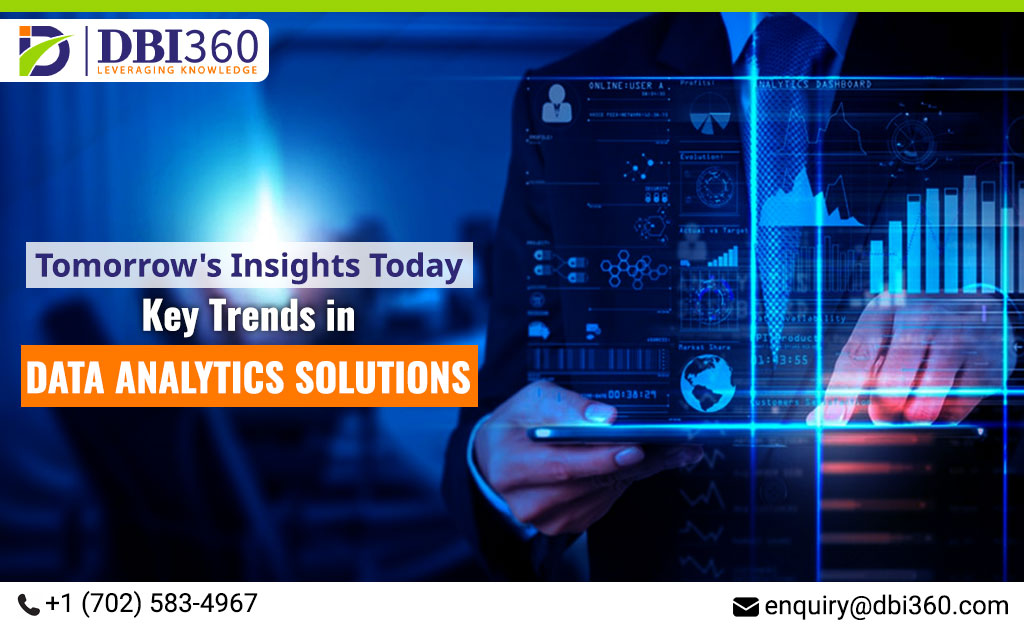In today’s fast-paced business landscape, data analytics solutions have become indispensable tools for organizations seeking to gain a competitive edge, make informed decisions, and unlock new opportunities. However, the field of data analytics is far from static. It constantly evolves, driven by technological advancements, changing consumer behavior, and emerging trends. To stay ahead in this dynamic environment, businesses must be aware of the latest developments in data analytics solutions. This article will explore the future of data analytics and the key trends to watch.
Emerging Trends to Watch Out:
1. AI-Powered Analytics
Artificial Intelligence (AI) and machine learning are poised to revolutionize data analytics. AI-powered analytics can analyze vast datasets, identify patterns, and generate insights at speeds and scales impossible for humans. Machine learning algorithms can continuously improve their analytical capabilities, making them invaluable for predictive and prescriptive analytics.
2. Data Democratization
Data democratization is a trend focused on making data and analytics accessible to non-technical users. Self-service analytics tools and intuitive dashboards empower employees to explore data, generate reports, and make data-driven decisions. This trend promotes a culture of data-driven decision-making throughout an organization.
3. Advanced Data Visualization
Data visualization goes beyond traditional charts and graphs. Advanced visualization techniques, including 3D visualizations, augmented reality (AR), and virtual reality (VR), are emerging to help users gain deeper insights from data. These immersive experiences enable users to interact with data in previously unimaginable ways.
4. Real-Time Analytics
The need for real-time insights continues to grow across industries. Businesses want to make decisions based on the most up-to-date information. Real-time analytics solutions are evolving to meet this demand, providing instant insights, and enabling organizations to respond quickly to changing conditions.
5. IoT and Edge Analytics
The Internet of Things (IoT) generates vast data from connected devices. Edge analytics, which processes data closer to its source, is gaining prominence. This allows for faster analysis of IoT data, reducing latency and enabling real-time decision-making in IoT applications.
6. Data Privacy and Ethics
Data privacy and ethical considerations are increasingly important in data analytics. As regulations like GDPR and CCPA become more stringent, businesses must prioritize data privacy and ensure ethical data usage. Transparency and responsible data practices will be central to maintaining public trust.
7. Hybrid and Multi-Cloud Analytics
Hybrid and multi-cloud environments are becoming the norm for many organizations. Analytics solutions that seamlessly integrate with and analyze data from various cloud providers and on-premises systems will be essential for managing data across diverse infrastructures.
8. Natural Language Processing (NLP)
NLP is making data analytics more accessible through voice and text-based interactions. Chatbots and virtual assistants with NLP capabilities can answer questions, provide insights, and generate reports, making data analytics more user-friendly.
9. Predictive Maintenance
In industries like manufacturing and utilities, predictive maintenance is a game-changer. Data analytics solutions can predict when equipment will likely fail, allowing for proactive maintenance and cost savings.
10. Data Governance and Security
With the increasing importance of data, robust data governance and security measures are crucial. Businesses must invest in technologies and practices that protect data integrity and ensure compliance with regulations.
The Road Ahead
In conclusion, the future of data analytics solutions is exciting and filled with possibilities. Businesses that harness the power of AI, embrace data democratization, adopt advanced visualization techniques, and stay abreast of emerging trends will be well-positioned to thrive in an increasingly data-driven world. The future belongs to those who can extract meaningful insights from the ever-expanding sea of data.

